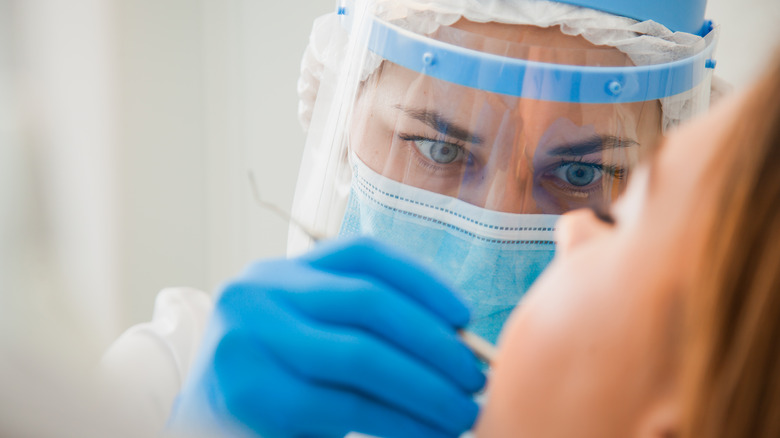If This Happens To Your Teeth, It Could Be A Sign Of Diabetes
Diabetes isn't often associated with dental health. For the most part, the disease is linked with appetite issues and more frequent trips to the bathroom (via CDC). These symptoms are certainly connected to the condition, whether the diabetes in question is type one or type two. They often manifest because a person's fluctuating blood sugar levels can cause spikes and crashes in their appetite level. They also become very thirsty. Their increased fluid intake leads to more frequent bathroom trips, especially at night.
But diabetes symptoms don't stop there. Blurred vision is another common symptom, albeit one that many people may not be familiar with. Other symptoms that aren't as widely known as the changes in appetite and thirst are dry skin and slowed healing.
However, the most overlooked symptoms of diabetes just might be the ones that happen in a person's mouth. These are common enough that the American Dental Association dedicated a page to them on their website — even though many don't seem to see the warning signs for what they are.
Diabetes can be a pain in the mouth
The American Dental Association states that over 9% of the American population has diabetes, roughly equivalent to around 29 million people. Among all those millions of people, there is a common dental issue that occurs repeatedly — one that's linked to the dry mouth and increased thirst symptoms reported by many diabetes patients.
Diabetes reduces a person's saliva production. Saliva acts as a protective coating for teeth and when there isn't enough of it, our teeth become more vulnerable to infection. Over time, these infections lead to an increase in both the number of cavities in a person's mouth and their severity when they develop. Moreover, people with diabetes are more prone to oral infections. While this is due in part to the lack of protective saliva in the mouth, it is also because high blood sugar weakens a person's white blood cells, leaving them more open to infections of all kinds (via CDC). It also explains why people with diabetes tend to heal more slowly from wounds: Their white blood cells just aren't as effective as they normally should be.
There are many other reasons that a person might develop cavities. But if you're experiencing them more frequently than usual alongside other symptoms of diabetes, it may be time for a check-in with a medical provider.


